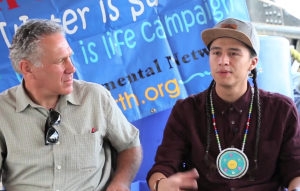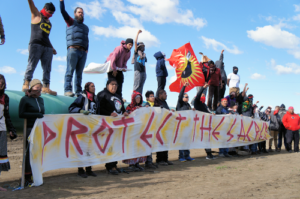As th e world looks to Lima, Peru for the 20th UN COP on Climate Change, The International Rights of Nature Tribunal is set to convene in tandem. The Tribunal will hear twelve international cases that are aligned with UNFCCC COP 20 priorities. What is unique to this hearing is that each case will be reviewed within a framework based on Rights of Nature and the Universal Declaration of the Rights of Mother Earth.
e world looks to Lima, Peru for the 20th UN COP on Climate Change, The International Rights of Nature Tribunal is set to convene in tandem. The Tribunal will hear twelve international cases that are aligned with UNFCCC COP 20 priorities. What is unique to this hearing is that each case will be reviewed within a framework based on Rights of Nature and the Universal Declaration of the Rights of Mother Earth.
“We the people assume the authority to conduct an International Tribunal for the Rights of Nature,” declared Ramiro Avila, prosecutor for the Earth, during the opening of the world’s first Tribunal on the Rights of Nature in Quito, Ecuador last January. “We will investigate cases of environmental destruction which violate the Rights of Nature.”
The diverse international panel of judges on the Tribunal in Lima includes:
Alberto Acosta, Tribunal’s President, economist and former President of the Constituent Assembly from Quito, Ecuador
Verónica Mendoza, Peru Congress member, representative of the region of Cusco.
Raúl Prada Alcoreza, Philosopher, sociologist, author, former member of the Bolivian Constituent Assembly of 2006-2007, Bolivia
Hugo Blanco, Political leader, leader of the Confederación Campesina del Perú, Peru.
Tantoo Cardinal, actress (e.g., Dances with Wolves) and activist from the Tar Sands of Canada.
Blanca Chancoso, Kichwa leader and educator from Cotacachi, Imbabura, Ecuador.
Edgardo Lander, sociologist, professor, from Venezuela.
Tom Goldtooth, Dine’/Dakota, director of Indigenous Environmental Network from MN, USA
Anibal Quijano, sociologist and humanist thinker. Professor of critical theory, Perú.
Francios Houtart, professor, philosopher, theologian, from Belgium.
Osprey Orielle Lake, Co-Founder and Executive Director, Women’s Earth & Climate Action Network, USA
Rocío Silva Santiesteban, National Human Rights Coordinator, author, professor, Perú
Atossa Soltani, founder and Executive Director of Amazon Watch, USA
Terisa Turner, professor Sociology and Anthropology, former UN Energy Specialist, Canada
Ramiro Ávila, environmental attorney from Ecuador serves as the Prosecutor for the Earth.
Natalia Greene and Robin Milam, Global Alliance for the Rights of Nature, serve as Secretariat.
The cases and lead presenters include:
Climate Change and False Solutions Pablo Solón, Bolivia: Nnimmo Bassey, Nigeria
BP Deepwater Horizon Oil Spill Esperanza Martínez, Ecuador
Hydrodraulic Fracking Shannon Biggs, United States; Martin Vilela, Bolivia
Chevron/Texaco Oil Devastation Pablo Fajardo, Ecuador;
Yasuní-ITT Oil Development Yasunidos, Ecuador
Great Barrier Reef Michelle Maloney, Australia
4 Amazon River Basins of Peru Sarah Kerremans, Jose Fachin, Aurelio Chino, Peru
Belo Monte Dam Representatives Movimento Xingu Vivo Para Sempre, Brasil
Bagua Defenders of Earth Bagua Community leaders
Conga-Cajamarca Mine Milton Sanchez, Marco Arana, Perú
Forests and REDD+ Casandra Smithie, USA
Condor Mine Open Pit Copper Domingo Ankuash, Ecuador
Indigenous rights activist Casey Camp-Horinek (Ponca from Oklahoma, USA) and Patricia Gualinga, an indigenous of the Amazon and director of Sarayaku, will provide expert witness testimony on the critical importance of Rights of Nature.
“What will happen if the temperature increases more than 2 °C? A third of the population of animals and more than half of the plants on Earth could disappear.” Listing violations to the Rights of Mother Earth related to climate change, Pablo Solon went on to add, “We need a new system of harmony between human beings and Mother Earth that replaces the capitalist system of infinite growth for the accumulation of capital.”
The International Tribunal will be held at the Gran Hotel Bolivar on Plaza San Martín, Jirón de La Unión 958, in the historic district of Lima. The Public is invited to attend free of charge. The Tribunal begins at 8:30am and concludes at 19:00 on Friday December 5 and Saturday December 6, 2014. Six cases will be heard with closing responses from the Tribunal judges each day.
The Global Alliance for Rights of Nature was founded at a gathering in Ecuador in 2010, two years after Ecuador became the first nation in the world to adopt Rights of Nature in its Constitution and Bolivia passed its Law of the Rights of Mother Earth. Across the United States dozens of communities have adopted local rights of nature laws within the framework of a Community Bill of Rights in recent years.
The Rights of Nature movement draws on the wisdom and cosmovision of indigenous peoples in positing a new jurisprudence that recognizes the right of nature in all its forms to exist, persist, evolve and regenerate.
More information available at http://therightsofnature.org/lima-2014-tribunal/
In Spanish at http://therightsofnature.org/tribunal-internacional-derechos-de-la-naturaleza/
CONTACT: Natalia Greene +593 (0) 99944-3724/nati.greene@gmail.com
Robin R. Milam +1.530.263-1483/Nature@TheRightsofNature.org



